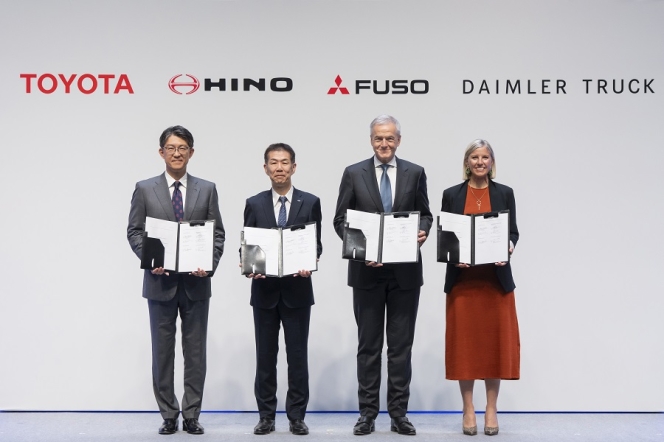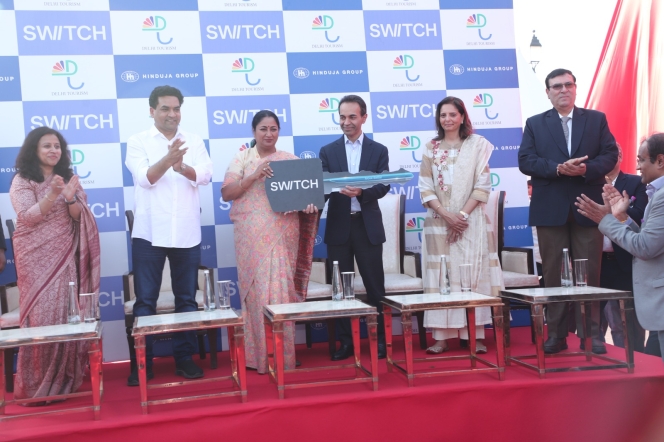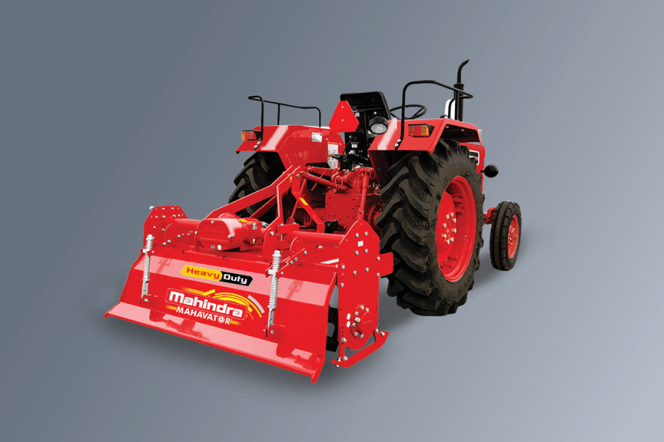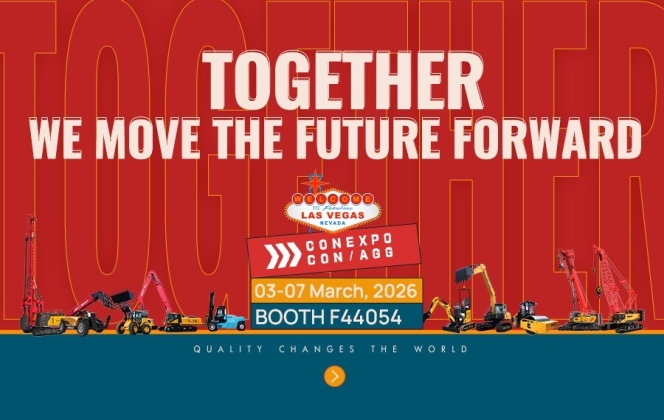- Daimler Truck
- Mitsubishi Fuso
- Hino Motors
- Toyota Motor Corporation
- Karl Deppen
- Larom Radstrom
- Koji Sato
- Satoshi Ogiso
- Mitsubishi Fuso Truck and Bus Corporation
Mitsubishi Fuso and Hino Motors to Merge Under New Holding Company by 2026
- By MT Bureau
- June 11, 2025

L-R: Koji Sato, CEO, Toyota Motor Corporation; Satoshi Ogiso, CEO, Hino Motor Corporation; Karl Deppen, CEO, Mitsubishi Fuso & designated CEO of new holding company and Karin Radstrom, CEO, Daimler Truck.
In a landmark move for Japan’s commercial vehicle sector, Mitsubishi Fuso Truck and Bus Corporation and Hino Motors have signed definitive agreements to integrate their operations. The merger will take place under a new holding company set to be established by April 2026, with Tokyo as its headquarters.
The new combined entity will have over 40,000 employees with the scale, resources and technology leadership to disrupt the commercial vehicle landscape in the Asia-Pacific region and beyond. It will own 100 percent of Mitsubishi Fuso and Hino Motors.
The integration is the result of a collaboration between four major automotive players: Daimler Truck AG, Mitsubishi Fuso, Hino Motors and Toyota Motor Corporation. Both Daimler Truck and Toyota plan to acquire a 25 percent stake each in the newly listed holding company, which will in turn fully own Mitsubishi Fuso and Hino. The new entity is expected to be listed on the Prime Market of the Tokyo Stock Exchange, with Karl Deppen, current CEO of Mitsubishi Fuso, appointed as CEO of the holding company.
The partnership is designed to bring Mitsubishi Fuso and Hino together on an equal footing, with joint efforts across commercial vehicle development, procurement and production. It aims to enhance operational efficiency, improve global competitiveness and bolster the automotive industry across Japan and Asia.
The alliance underscores the companies’ shared vision of supporting society through sustainable mobility. A key focus of the integration will be addressing the urgent challenges facing the commercial vehicle industry, including decarbonisation, logistics efficiency and the development of CASE technologies (Connected, Autonomous, Shared and Electric mobility) alongside the adoption of hydrogen solutions.
Karin Radstrom, CEO, Daimler Truck, said, “The now decided integration of Mitsubishi Fuso and Hino Motors is truly historic. We are bringing together two strong partners to form an even stronger company and to successfully shape the decarbonisation of transportation. Together, Mitsubishi Fuso and Hino Motors have great potential to leverage scale – and scale is key to win in the technological transformation of our industry. Karl Deppen is an experienced and strong leader who comprehends the whole value chain of our business and I’m therefore convinced that he can bring the new company to the next level.”
Koji Sato, CEO, Toyota Motor Corporation, said, “We believe that the future is for us to build together. Today’s final agreement is not the goal but the starting line. Our four companies, aiming to achieve a sustainable mobility society, will continue to create the future of commercial vehicles together.”
Karl Deppen, CEO, Mitsubishi Fuso and designated CEO of new holding company, said, “Today is a great day for all our stakeholders. We are shaping the industry by bundling our strengths. With a strong new company we combine our two trusted brands, our resources, competencies and expertise to even better support our customers in their transportation needs in the future. I feel honoured and excited to be the designated leader of the new company and am grateful for the trust and encouragement from Toyota and Daimler Truck to make it happen.”
Satoshi Ogiso, CEO, Hino, said, “Cooperation among these 4 companies is truly ‘once-in-a-lifetime opportunity’. In addition to operational synergy, we can expect immeasurable synergy affection from synthesising different culture and climate of us. Under commonly aimed aspiration, we are confident with building strong and resilient team to empathising with each other and contributing to society. As a new commercial vehicle company rooted in Japan, we collaboratively create ever better future.”
Switch Mobility Deploys Electric Double-Decker Bus For Delhi Sightseeing
- By MT Bureau
- February 28, 2026

Switch Mobility, the electric vehicle arm of Ashok Leyland and part of the Hinduja Group, has announced the deployment of its Switch EiV 22 electric double-decker bus for the ‘Dekho Meri Dilli’ sightseeing route in the capital. The initiative is being implemented under the Hinduja Group’s Corporate Social Responsibility (CSR) programme.
The service provides residents and tourists with a zero-emission transport option to visit heritage landmarks. The full-day route begins at Dilli Haat – INA and includes stops at Vijay Chowk, Rashtrapati Bhavan, the National Museum, the National Gallery of Modern Art, the Pradhan Mantri Sangrahalya and the National War Memorial at India Gate.
The Switch EiV 22 is a standard-floor, air-conditioned electric double-decker designed and manufactured in India. The vehicle utilises a lightweight aluminium body and features a rear staircase and a wide rear door for passenger access.
Key technical features include:
- Battery: 231 kWh NMC (Nickel Manganese Cobalt) chemistry battery pack.
- Range: Up to 250 km on a single charge.
- Architecture: 650V system with a dual-gun charging setup.
- Capacity: Seating for 65 passengers.
- Cooling: Liquid-cooled battery technology for thermal management.
The bus components are manufactured domestically to comply with FAME II standards. Switch Mobility currently operates electric double-deckers in Mumbai, Ahmedabad, Bhubaneswar and Kerala, with a total of 100 electric tourist buses operational across 10 locations in India.
Mahindra Launches New Rotavator Series For Heavy-Duty Tillage
- By MT Bureau
- February 27, 2026

Mahindra & Mahindra, a manufacturer of tractors and farm machinery, has announced the launch of a new rotavator series. The range is positioned in the heavy-duty category under the Mahavator and Mahavator HD brands, covering widths from 4 to 9 feet.
The series features a wider mast design intended to improve stability and handling during tillage. According to the company, the structural changes were developed based on market analysis and feedback from farmers to address durability on uneven farm surfaces.
The new series replaces several existing models while sitting alongside Mahindra’s current portfolio. A key technical feature in the lineup is the ‘Tez-e’ Intelligent Rotavator, which utilises integrated Bluetooth technology. This system transmits real-time operational data from the farm to a mobile application to support precision farming.
The products are being manufactured at Mahindra’s dedicated units in Nabha, Punjab and Zaheerabad, Telangana.
The company has also introduced limited tricolour-inspired versions in Metallic Orange, Everest White and Metallic Green.
Dr. Anusha Kothandaraman, Vice President & Head – International Operations & Business Head – Farm Machinery, Mahindra Farm Equipment Business, said, “Farm mechanisation is crucial to farm productivity and rotavators play a crucial role in efficiently preparing farmlands. At Mahindra our newly designed rotavators are developed to further deliver superior performance, while also elevating a farmer’s sense of ownership of the farm equipment that support their livelihood beyond tractors. Offered initially in the 4 to 9 feet category, the new look rotavators will reach farmers through a phased rollout across Mahindra's extensive dealer network.”
- Tata Motors
- V.O. Chidambaranar Port Authority
- VOCPA
- Green Hydrogen Internal Combustion Engines
- Sarbananda Sonowal
- hydrogen
- Tata Prima 55-tonne
- Susanta Kumar Purhoit
- Rajesh Kaul
Tata Motors And VOC Port Authority Partner To Deploy 40 Hydrogen-Powered Trucks
- By MT Bureau
- February 26, 2026
Tata Motors has signed a Memorandum of Understanding (MoU) with the V.O. Chidambaranar Port Authority (VOCPA) to deploy 40 heavy-duty trucks powered by Green Hydrogen Internal Combustion Engines (H2 ICE). The agreement was signed in the presence of Sarbananda Sonowal, Union Minister of Ports, Shipping and Waterways.
The project involves a trial phase with a single hydrogen-powered prime mover, followed by the deployment of the remaining fleet over the next two years. Funding for the initiative is provided by the Ministry of Ports, Shipping and Waterways as part of a national strategy to decarbonise maritime logistics.
To support the fleet, VOCPA is developing a 2 MW electrolyser and a hydrogen refuelling station within the port. The trucks selected for this deployment are Tata Prima 55-tonne prime movers. These vehicles utilise H2 ICE technology, which adapts internal combustion principles to run on hydrogen instead of diesel, aiming for zero-tailpipe CO2 emissions.
The Prima trucks include driver-assist safety features and cabins designed to reduce fatigue during cargo handling operations. Tata Motors previously initiated hydrogen truck trials on freight corridors in 2025 and currently operates 15 hydrogen fuel cell buses in India.
Susanta Kumar Purohit, Chairperson, VOCPA, said, “Our partnership with Tata Motors marks a transformative step in VOC Port’s push to achieve net-zero emissions. The deployment of green hydrogen-powered trucks will significantly decarbonise our cargo handling operations while setting a benchmark for sustainable port-led logistics in India. To support the phased induction of these Green Hydrogen trucks, the port is also progressing plans to establish a 2 MW electrolyser and a dedicated hydrogen refueling station. This project along with various other initiatives related to green fuels reinforces our commitment towards building a robust green hydrogen ecosystem and positioning VOC Port as a leader in sustainable maritime infrastructure.”
Rajesh Kaul, Vice-President and Business Head – Trucks, Tata Motors, said, “Our collaboration with V.O. Chidambaranar Port Authority marks an important milestone in bringing hydrogen-powered heavy-duty trucking into real-world port operations. Over the past several months, we have worked closely with the port authorities to assess pathways for hydrogen trucks in cargo handling applications. This pilot will help demonstrate the potential of assessing the TCO parity and with Green Hydrogen in supporting the transition of India’s ports towards cleaner and more sustainable logistics solutions.”
SANY To Showcase Comprehensive North American Portfolio At CONEXPO 2026
- By MT Bureau
- February 25, 2026

SANY is set to make a significant impact at the CONEXPO-CON/AGG 2026 trade show, taking place at the Las Vegas Convention Center. The company will present its most comprehensive portfolio to date for the North American market, featuring an expansive display of machinery, digital technology and service capabilities. Operating under the theme ‘Together, We Move the Future Forward’, SANY will highlight the convergence of robust performance, intelligent innovation and lasting customer relationships as key drivers for the industry's evolution.
Visitors to Booth F44054 will encounter an impressive lineup of 32 machines and 17 attachments, with the spotlight on 10 newly introduced models engineered specifically for North American requirements. Among these, the SY10U Mini Excavator stands out for its zero tail swing design, providing exceptional manoeuvrability in confined spaces. Its operation is enhanced by a full hydraulic load sensing system, a suspension seat and wide armrests, ensuring a premium operator experience. The larger SY335LC Medium Excavator is powered by a substantial 9L Cummins engine generating 209 kilowatts. This powertrain delivers 204 kN of bucket force and 153 kN of arm force, resulting in digging performance that is both powerful and precise for its class.
In the lifting category, the SCA3300A Lattice Boom Crawler Crane incorporates a smart windshield that automatically adjusts its tint based on sunlight intensity. It also offers an optional auxiliary power unit designed to optimise energy savings and lower emissions. Similarly, the SCA1100TB Telescopic Crawler Crane features an optional APU to reduce fuel consumption and engine wear, while a 360-degree surround view monitoring system enhances safety during lifts. The new generation SW940L Wheel Loader integrates a Cummins B6.7 engine with ZF transmission and drive axles. Its advanced full electronic control system ensures compatibility with mainstream attachments and enables intelligent functions like automatic limit control, one-touch bucket shake, parallel lift, tyre pressure monitoring and smart attachment selection and positioning. The STH5519 Telehandler comes standard with reversing radar and load moment protection. An integrated multifunction joystick is designed to improve operational efficiency by 20 percent, while a stability coefficient exceeding 1.3 promotes safer lifting operations.
Beyond the equipment itself, SANY will demonstrate a suite of intelligent solutions aimed at minimising downtime and maximising productivity. These include the SANY AI Service Assistant, which provides intelligent diagnostics, interactive fault identification and quick parts identification for efficient maintenance. The SANY RootPilot system offers high precision 3D guidance for smarter and faster construction processes. In a compelling live demonstration, SANY will remotely control an excavator located in Huzhou, China, directly from its US showroom, a distance of over 6,500 miles, using AI-assisted technology with one-click digging and loading capabilities. These technological demonstrations will be complemented by a showcase of SANY's comprehensive service capabilities, all designed to ensure equipment operates smoothly and reliably.






Comments (0)
ADD COMMENT